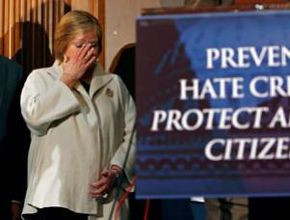We often use the term "hate" loosely. From our early years we proclaim to hate vegetables. Later on in life, teenagers profess undying hatred of the parents who refuse to extend curfew by a half hour. In actuality, these scenarios more accurately describe a strong aversion or dislike of the situation or legume at hand. But true hatred has appeared all too often throughout history. Religious and political wars have claimed the lives of millions and innocent people have been killed for no greater reason than they were different in socially unacceptable ways.
The common denominator in most acts of hatred is fear, usually fear of different types of people or ideas. This is why hatred is most often directed toward people of differing race, sexual orientation, religious background or some other criterion. People are threatened by the unknown and seek to extinguish this fear, resulting historically in massive death tolls, slavery and other injustices.
Advertisement
Merriam-Webster defines xenophobia as "fear and hatred of strangers or foreigners or of anything that is strange and foreign." Some psychologists assert that hatred isn't inherent at birth. Instead, they believe this emotion is learned over time, sometimes rearing its ugly head later in life in the form of bigotry, prejudice and even hate crimes.
While hatred may not be instinctual, distrust might just be. Long before the existence of codified law, uncivilized people lived defensively and territorially. These people didn't take kindly to unfamiliar people on their turf. Rather than approaching with a handshake and a smile, they usually responded to possible threats with violence. Since the people who took the "kill rather than be killed" approach survived and reproduced, this attitude evolved over time into the instant classification of strangers. As such, the idea of "us vs. them" became instinctual and socially acceptable.
In this article you will learn more about the various types of hatred-inspired beliefs that persist in today’s society. In addition, this article will detail the difference between hate crimes and regular crimes, as well as why they happen and how they have snowballed out of control in the past.
Advertisement



